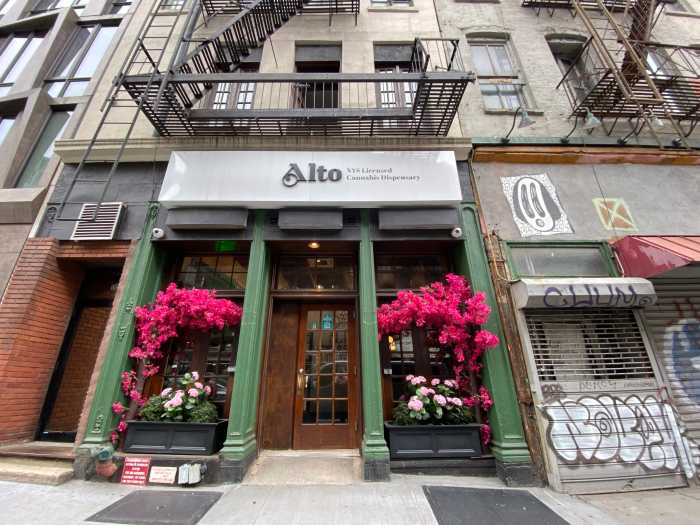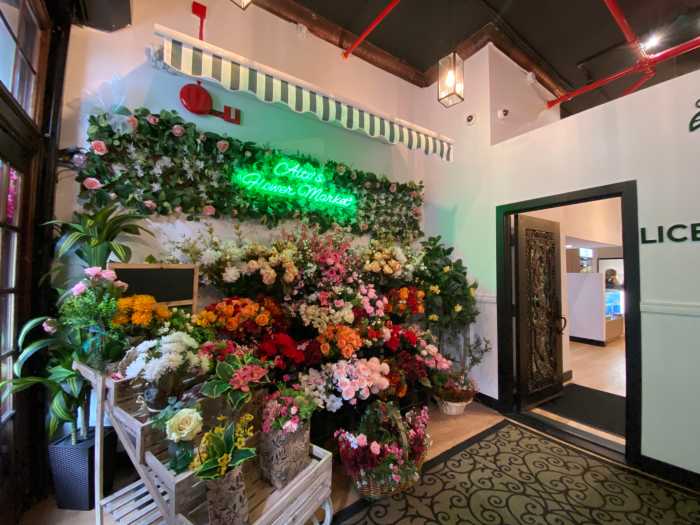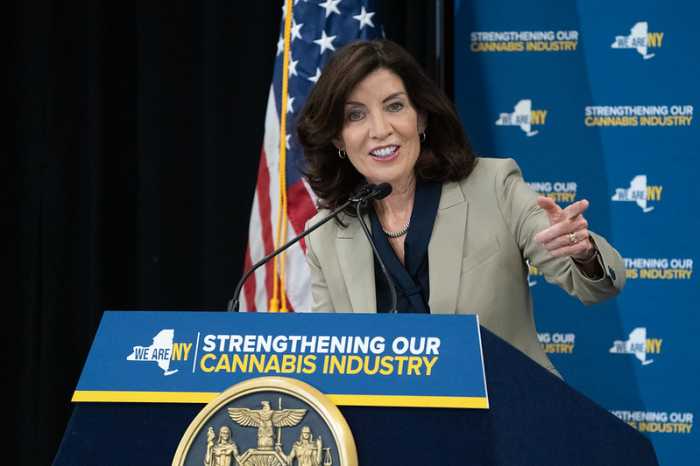Gov. Kathy Hochul is promising that 89 licensed cannabis dispensaries in New York City, and dozens more statewide, will not be forced to shut down after the state’s Office of Cannabis Management (OCM) announced that those retail dispensary locations are out of compliance with the state’s proximity rules.
The OCM informed the 152 cannabis businesses and license applicants statewide on Monday that, following an internal review, the state body had not been properly applying the law that prohibits any cannabis retail storefront from operating within 500 feet of school grounds or 200 feet of a house of worship.
Since its inception in 2022, OCM has been using an incorrect method to assess the dispensary’s distance from school grounds: measuring from entrance to entrance.
Under the corrected approach and stricter interpretation of the 2021 Marijuana Regulation and Taxation Act, OCM is now measuring the distance as a straight line from the dispensary’s main entrance to the nearest school property line.
As a result, 44 retail applicants and 108 licensed businesses across the state were notified that their proposed or current locations do not comply with the law, leaving them in limbo to wait for a resolution or search for alternative premises.
The majority of those affected are in the five boroughs, with 38 applicants and 89 licensees located in non-compliant zones.
For Alto, a family-run dispensary in Tribeca, a miscalculation of fewer than 20 feet has pushed them out of compliance with state cannabis law — leaving the Savocchi family blindsided and grappling with the possibility of having to rebuild their business from the ground up.
“We got the email at like, three minutes to five this past Monday, and I couldn’t even believe what I was reading,” said André Savocchi, one of five siblings who opened Alto alongside their parents last Labor Day weekend. “I was silent for the rest of the day; it just didn’t seem real.”
 The exterior of Alto, a family-owned cannabis dispensary, is seen at 110 Chambers St. in Tribeca on Aug. 1 Photo by Adam Daly
The exterior of Alto, a family-owned cannabis dispensary, is seen at 110 Chambers St. in Tribeca on Aug. 1 Photo by Adam Daly
The Savocchi family said they followed the rules to the letter, navigated the state’s complex cannabis laws, and turned a shuttered bar that had sat vacant for two years into a sleek dispensary.
Renovations were extensive and expensive. “The air conditioning alone was over $100,000,” Sandra, the family’s matriarch, said, adding that the building had to be converted to electric due to a gas leak.
“They told us, yes,” Sandra recalled. “The OCM had to measure and tell us, ‘Yes, this is a viable location. You can proceed.” Now, they will have to wait at least another five months before they know their fate.
“We’re still having sleepless nights,” she said, despite assurances from the state.
Alto operates under a 12-year lease with a five-year extension option and recently took on six non-family staff members amid its growing customer base.
“We just want to stay in the location we built, the one that was approved from the beginning,” André said. He recalled the difficulty of securing a compliant location and a landlord willing to lease to a cannabis business, noting that many had federal mortgage restrictions.
The idea of relocating now, he said, “seems like it would be impossible.”
 The family-run cannabis shop features floral arrangements and other welcoming touches near the security check-in area Photo by Adam Daly
The family-run cannabis shop features floral arrangements and other welcoming touches near the security check-in area Photo by Adam Daly
Since news broke Monday, Gov. Hochul has been steadfast in assuring those affected that they will “not be punished for the failures of past OCM leadership.”
“At her direction, the State is taking immediate action to support cannabis store owners impacted by this issue,” a spokesperson for the Governor said. “We are laser-focused on making sure these small business owners, who have poured their heart and soul into these shops, aren’t left paying the price for the previous leadership’s screw-up.”
According to a senior official in Hochul’s office, the governor was briefed on the situation recently and “furious” about the impact on small businesses. She reportedly convened staff immediately after learning of the problem and directed OCM to find a resolution “with the least amount of harm possible.”
At the governor’s direction, OCM on Monday released an advisory assuring current license holders that no renewal decisions will be made until lawmakers can consider a fix, which could possibly be when the state legislature convenes at the beginning of next year.
The Savocchi family remains hopeful. They say they’ve received a supportive phone call from OCM staff and feel that the state body wants to do right by them, even as uncertainty weighs on them.
“Now, it’s torturous,” Sandra added. “A waiting game. You don’t know which way to go.”
‘Lawsuits all the way down’
The OCM stated that for license holders who are due to renew during the limbo period, the State Administrative Produce Act will allow them to operate under the expired license if they submit their renewal application “timely and sufficient.”
“OCM will consider a renewal application ‘timely’ if the licensee submits for renewal on or before the date their license expires,” according to an advisory. “OCM will consider the licensee’s renewal application “sufficient” if there are no significant deficiencies in the application. If such conditions are met, the OCM will consider such a licensee eligible to continue operating.”
Hochul also directed the creation of a $15 million applicant relief program, which offers up to $250,000 in assistance to impacted applicants who have not yet opened.
That program does not apply to current licensees, though the governor said she is committed to ensuring none are “punished” for the “screw-up” of prior OCM leadership.
Speaking to NY1 yesterday, Governor Hochul was asked whether existing dispensaries could be grandfathered in through an exemption to the current proximity statute.
“I’d like to do that,” Hochul responded. “I don’t want them hurt. They’re part of our community already, they’re working hard, they waited a long time for this, and, basically, I don’t want them screwed.”
 Gov. Kathy Hochul speaks at a press conference in 2023 about the results of statewide enforcement actions against unlicensed cannabis businesses. Photo by Office of Governor Kathy Hochul
Gov. Kathy Hochul speaks at a press conference in 2023 about the results of statewide enforcement actions against unlicensed cannabis businesses. Photo by Office of Governor Kathy Hochul
The OCM did not immediately respond to a request for comment or to provide the names and locations of impacted businesses, though Gothamist previously published the full list.
The body stated that it will propose and actively pursue legislation that would allow affected licensees to remain at their current locations. However, the agency emphasized that passage of the proposed legislation is at the discretion of the state Legislature and “not a guarantee.”
“If the Legislature does not amend the law or amends the law in a fashion that does not remedy a license location’s noncompliance with the Cannabis Law, the renewal application must be
denied,” the advisory reads.
Given the uncertainty, Jeffrey Hoffman, a cannabis attorney whose clients are among the affected, believes the OCM and Cannabis Control Board will be on the hook for “significant damages” over the faux pas.
“That is why they are trying to get out in front of it, admitting their error, and offering something to those impacted,” Hoffman told amNewYork.
When asked about the legal course of the affected licensees and applicants, Hoffman predicts there will be “lawsuits all the way down.”
“The state has significant exposure to liability. A legislative fix may work, but it’s not clear to me that it’s a certainty,” he said, noting that at the moment, open stores are not guaranteed they will be able to renew their licenses at their current locations, while applicants who had proximity protection at now non-viable locations will not be able to open.
“If they are not very well capitalized, this might be the end of the road for them,” Hoffman said of the implications for cannabis entrepreneurs, many of whom spent years navigating bureaucratic hurdles.
“Imagine being locked into a 10-year lease or worse, having bought a building at a location you can no longer use,” he added.
